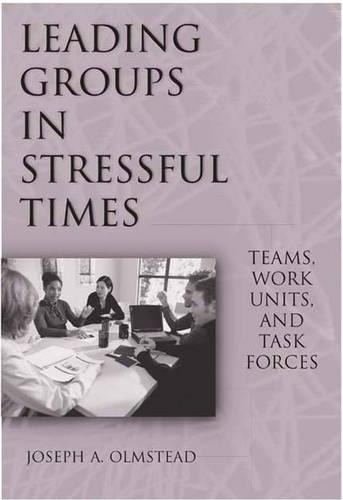
Leading Groups in Stressful Times: Teams, Work Units, and Task Forces
(Hardback)
Publishing Details
Leading Groups in Stressful Times: Teams, Work Units, and Task Forces
By (Author) Joseph Olmstead
Bloomsbury Publishing PLC
Praeger Publishers Inc
30th October 2002
United States
Classifications
Tertiary Education
Non Fiction
Personnel and human resources management
Coping with / advice about stress and stress-related issues or topics
658.3
Physical Properties
Hardback
272
Description
A lucid, purposeful analysis of how work groups perform under stress and how their leaders can, and must, reshape their leadership styles to assure the most successful outcomes. Under the greatest stress in most organizations today are people who work in groups: in teams, taskforces, and other units with special work goals and purposes. Customary manners of management style and leadership do not help to alleviate the stress, says psychologist Olmstead, and in his new, challenging book he shows why. Rapid change is one reason, high levels of uncertainty another. But the effects need not be as debilitating as they often are. Olmstead argues that groups can be developed to resist stress and achieve effectiveness despite it. It can be done best through leadership, the right kind, a kind that is different from customary leadership style and method. Olmstead develops a conceptual framework to explain why this is so, documenting his ideas meticulously. Then, drawing upon his own experiences supported by similar experiences of others who have worked in most types of organizations under various stress-inducing conditions, he shows how to do it. He provides practical, proven ways to analyze, assess, and improve your own leadership methods, and by doing so, beef up your group's performance. With a 250-item annotated bibliography, and written in a readable, lucid style, Olmstead's book is no exercise in theoretics. Rather, it is a straightforward, state of the art presentation of what leaders under stress need to know about themselves, and how to apply that understanding to the activities of the groups they lead, day by day.
Author Bio
JOSEPH A OLMSTEAD is Vice President, Product Development, at the Vanguard Research Group, Columbia, S.C. He earned a doctorate in psychology from the University of Texas, and served as Senior Staff Scientist and Program Director at the Human Research Office of the George Washington University.
